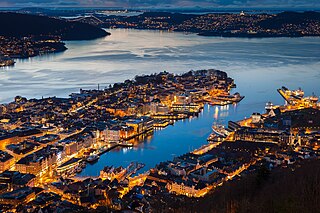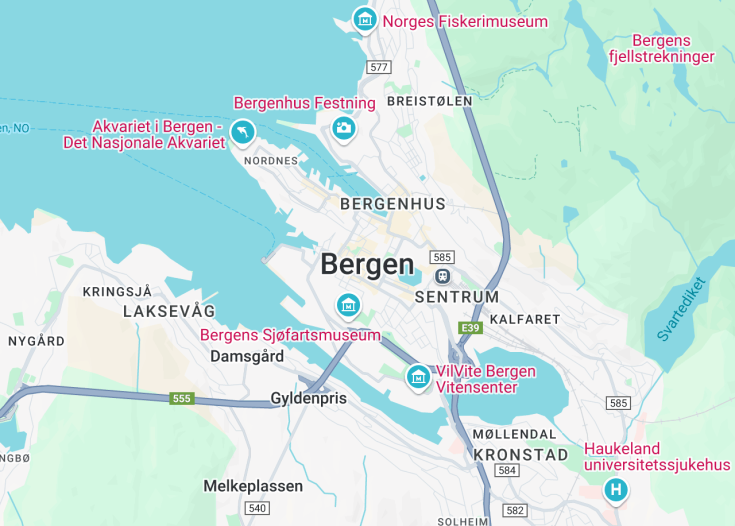Bergen, known affectionately as the “Gateway to the Fjords,” is a picturesque city nestled between mountains and fjords on the west coast of Norway. With its historic Bryggen Hanseatic wharf, a UNESCO World Heritage Site, Bergen offers a unique blend of cultural heritage and stunning natural beauty. The city’s vibrant atmosphere is enhanced by its bustling fish market, numerous museums, and annual festivals. The surrounding landscape provides ample opportunities for hiking, boating, and exploring the extensive fjords that define this region.
When visiting Bergen, be sure to explore the city on foot or by bicycle to truly appreciate its historic charm and beautiful setting.
Consider booking a guided tour of the fjords. This is an exceptional way to experience the breathtaking scenery around Bergen.
Top things to do & see in Bergen
Select the following sights and activities to discover best tickets and tours available in Bergen.
Bergen: Gateway to the Fjords
| Country | Norway |
| Time in Bergen | GMT+1 |
| Language spoken | Norwegian |
| Population | 283,929 (Statistics Norway, 2023) |
| Currency | Norwegian Krone (NOK) |
| Airports | Bergen Airport, Flesland (12 mi / 19 km). |
Bergen, known as the “Gateway to the Fjords”, is a city steeped in a rich maritime history and surrounded by picturesque landscapes. As Norway’s second-largest city, it serves as a major cultural hub in the western part of the country. Famous for its historical sites such as Bryggen, a series of Hanseatic commercial buildings lining the eastern side of the Vågen harbour, Bergen has been a UNESCO World Heritage Site since 1979.
The city’s setting on the world-renowned fjords offers stunning views and makes it a popular base for tourists looking to explore the scenic surroundings including fjords, mountains, and forests. Bergen is not only a historical treasure but also a vibrant modern city with a thriving cultural scene. It hosts several high-profile events such as the annual Bergen International Festival, which features performances in music, dance, and theatre. The city is known for its university, bringing a youthful energy and contributing to its lively atmosphere.
Additionally, Bergen’s culinary scene is thriving, with an emphasis on seafood caught directly from its clean, cold fjords. Despite its high latitude, Bergen’s climate is relatively mild thanks to the Gulf Stream. It’s often called the ‘city of rain,’ fostering a lush green environment that enhances its natural beauty. However, the city’s charm shines through its frequent showers, which often give way to clear, beautiful skies.
Visitors can explore numerous attractions such as the Fløibanen funicular, which climbs up Fløyen mountain, offering expansive views over the city. The city’s aquarium and several museums provide insights into Norway’s maritime history and natural environment. With its rich history, stunning environment, and vibrant culture, Bergen effortlessly combines old-world charm with modern conveniences, making it a must-visit destination in Norway.
Where is Bergen?
Bergen is located on the southwestern coast of Norway, surrounded by seven mountains and fjords.
What is Bergen famous for?
Bergen is most famous for its seven surrounding majestic mountains and dramatic fjords, which are key attractions for both national and international tourists. Additionally, Bergen’s historically significant harbor area, Bryggen, is recognized worldwide.
History
Bergen, located on the southwestern coast of Norway, has a rich history that began long before it was officially founded in 1070 by King Olav Kyrre. The area’s natural harbor and strategic location contributed to its development into a significant center of trade, culture, and governance.
Prehistory to 1070: Early Settlements
Archaeological evidence indicates that the area around Bergen has been inhabited since the end of the last Ice Age. Early inhabitants were attracted by the rich fishing in the nearby seas, which provided a stable food source. Over the centuries, small settlements developed into thriving communities.
1070-1350: The Foundation and Growth
King Olav Kyrre’s establishment of the city in 1070 marked a new era. Bergen quickly grew as a prominent trading hub, facilitated by its inclusion in the Hanseatic League. The city became the league’s most important city in Norway, dealing mainly in dried fish and grains. [h4]1350-1700: The Hanseatic League Dominance[/h4] The Hanseatic merchants eventually dominated Bergen’s economic life, establishing the Bryggen area where Germanic influence was strong. Despite frequent fires, the wooden houses of Bryggen were rebuilt in the same traditional style, today recognized as a UNESCO World Heritage site.
1700-1900: National Integration and Expansion
As the Hanseatic League’s influence waned, Bergen’s local commerce began to thrive anew. Norway’s 1814 constitution brought a period of national revival, and Bergen embraced a fervent patriotic spirit. The introduction of steamships in the 19th century reinforced Bergen’s role as a major Norwegian port.
1900-Present: The Contemporary City
In the 20th century, Bergen developed into a center of education, culture, and maritime activity. The city was occupied during WWII, enduring significant damage, but it recovered swiftly. In recent decades, Bergen has emphasized cultural heritage and tourism, alongside its traditional maritime industries.
Visit Bergen
What to see and do in Bergen
Bergen, known for its stunning natural surroundings and historical architecture, offers numerous attractions:
- Explore Bryggen: Walk through the historic wharf of Bergen, comprised of colorful timbered houses and narrow alleyways.
- Visit the Bergenhus Fortress: One of Norway’s oldest and best-preserved fortifications.
- Ride the Fløibanen Funicular: Ascend to the top of Mount Fløyen for breathtaking city and fjord views.
- Discover the Fish Market: Immerse yourself in local culture by visiting one of Norway’s most famous outdoor markets.
- Museum hopping: The Hanseatic Museum and Schøtstuene, Bergen Art Museum, and the Edvard Grieg Museum offer cultural insights.
Festivals in Bergen
Bergen hosts a variety of cultural and musical events throughout the year, notably:
- The Bergen International Festival (May-June): Norway’s largest cultural festival featuring music, theatre, and dance.
- Bergenfest (June): A multi-genre music festival attracting international artists.
- The Bergen Food Festival (September): Showcases local food traditions and innovations.
Best time to visit Bergen
The best time to visit Bergen is from May to September when the weather is most favorable, and the city’s cultural life is particularly vibrant due to numerous festivals and outdoor activities.
Is Bergen worth visiting?
Bergen is undeniably worth visiting, offering a unique blend of natural beauty, historical significance, and vibrant cultural life. The city’s ability to preserve its past, while continually evolving to embrace the modern, makes it a fascinating destination for any traveler.










